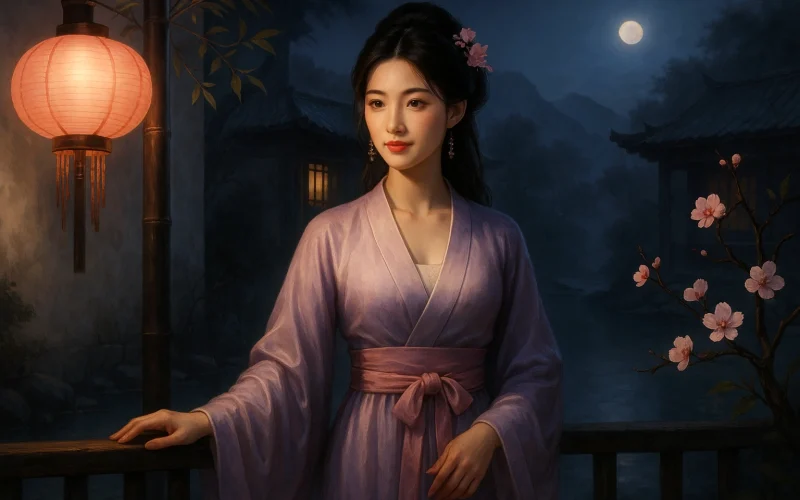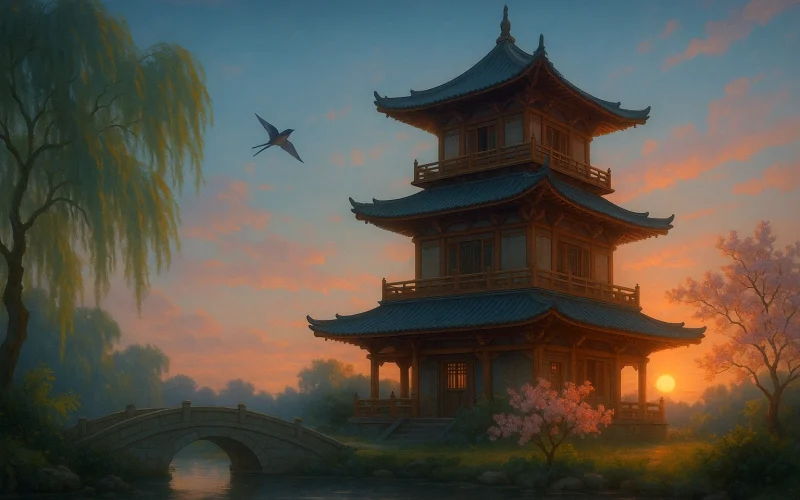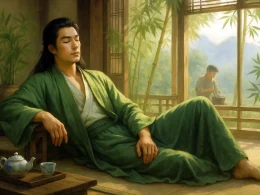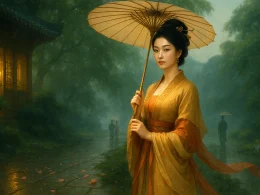Night hastens the watch,
Clear dust drinks dew,
Dim moon veils the songstress' lane.
Bamboo rails, lamplit window—
I know Qiuniang's domain.
We met with smiles,
Like jade trees entwined,
Or sunlit rainbows aligned.
Her eyes—streams; her soul—orchids—
A vision beyond mankind.
Once I knew her face in art,
But who could foresee—
At Jasper Terrace's edge,
Our cloud-soft love,
Torn by cruel wind's siege?
Now in desolate cold,
I lodge in an empty hall.
Closed gates, crumbling walls—
Autumn crickets mourn.
Alas! This thread of longing—
No hills or streams can rend or stall.
Original Poem
「「拜星月慢 · 夜色催更」周邦彦」
夜色催更,清尘收露,小曲幽坊月暗。
竹槛灯窗,识秋娘庭院。
笑相遇,似觉琼枝玉树相倚,暖日明霞光烂。
水盼兰情,总平生稀见。画图中、旧识春风面。
周邦彦
谁知道、自到瑶台畔。
眷恋雨润云温,苦惊风吹散。
念荒寒、寄宿无人馆。
重门闭、败壁秋虫叹。
怎奈向、一缕相思,隔溪山不断。
Interpretation
This lyric masterpiece by Zhou Bangyan, composed during his middle years, exemplifies his signature style—melding refined elegance with lingering sentiment. Through layered recollections of a bygone romance, the poem traces emotional arcs from first encounter to parting sorrow, showcasing Zhou's unparalleled ability to capture feminine beauty and nuanced feelings. As a leading figure of the "Graceful and Restrained" school, Zhou here perfects the art of conveying profound longing through exquisite imagery and controlled expression.
First Stanza: "夜色催更,清尘收露,小曲幽坊月暗。竹槛灯窗,识秋娘庭院。笑相遇,似觉琼枝玉树相倚,暖日明霞光烂。水盼兰情,总平生稀见。"
Yè sè cuī gēng, qīng chén shōu lù, xiǎo qū yōu fāng yuè àn. Zhú kǎn dēng chuāng, shí Qiū niáng tíng yuàn. Xiào xiāng yù, sì jué qióng zhī yù shù xiāng yǐ, nuǎn rì míng xiá guāng làn. Shuǐ pàn lán qíng, zǒng píng shēng xī jiàn.
Night's watch drums hasten hours,
dew cleanses dusty lanes,
moonlight dims in winding alleys.
Through bamboo railings and lit windows,
I recognize Autumn Lady's court.
Our smiling meeting—
jade branches intertwining,
sun-warmed clouds ablaze at dawn.
Her glance—clear streams;
her spirit—orchid's grace:
such rarity seen but once in life.
The stanza constructs a cinematic nocturne. The "hastening night drums" (夜色催更) and "dew-cleansed lanes" (清尘收露) establish temporal and sensory atmosphere, while "bamboo railings and lit windows" (竹槛灯窗) frame the encounter with pictorial precision. The central metaphor—"jade branches intertwining" (琼枝玉树相倚)—elevates human connection to cosmic harmony, with "sun-warmed clouds" (暖日明霞) radiating the lovers' mutual illumination. The closing couplet crystallizes feminine perfection through elemental purity ("clear streams") and botanical refinement ("orchid's grace"), achieving the Song dynasty aesthetic ideal of qing kong (清空)—clarity and spaciousness.
Second Stanza: "画图中、旧识春风面。谁知道、自到瑶台畔。眷恋雨润云温,苦惊风吹散。念荒寒、寄宿无人馆。重门闭、败壁秋虫叹。怎奈向、一缕相思,隔溪山不断。"
Huà tú zhōng, jiù shí chūn fēng miàn. Shéi zhī dào, zì dào yáo tái pàn. Juàn liàn yǔ rùn yún wēn, kǔ jīng fēng chuī sàn. Niàn huāng hán, jì sù wú rén guǎn. Chóng mén bì, bài bì qiū chóng tàn. Zěn nài xiàng, yī lǚ xiāng sī, gé xī shān bù duàn.
Her spring-breeze face
long known in paintings—
who knew upon Jade Terrace
we'd share rain-moistened clouds,
only for cruel winds to scatter us?
Now in desolate lodgings,
barred gates echo crickets' laments.
Yet stubborn love-threads
span rivers and peaks unbroken.
The concluding stanza unfolds as emotional archaeology. The "spring-breeze face" (春风面) recalls idealized portraiture, while "Jade Terrace" (瑶台)—the goddess' abode—transforms the beloved into celestial encounter. The central paradox of "rain-moistened clouds" (雨润云温) versus "scattering winds" (风吹散) encapsulates love's fragility. Spatial contrasts emerge starkly: from divine terraces to "desolate lodgings" (无人馆), from warm intimacy to "crickets' laments" (秋虫叹). The final image of "love-threads spanning peaks" (隔溪山不断) redeems physical separation through spiritual constancy, embodying the Confucian ideal of zhong (忠)—enduring fidelity.
Holistic Appreciation
Zhou constructs a diptych of memory and aftermath. The first stanza's luminous encounter—with its interwoven jade branches and orchid grace—gives way to the second's earthly aftermath of barred gates and insect dirges. This progression from celestial metaphor ("Jade Terrace") to gritty reality ("crumbling walls") mirrors the trajectory of idealized love confronting temporal erosion.
The poem's structural brilliance lies in its emotional choreography: the nightwatch drums' urgency yields to dawn's radiant meeting, which in turn collapses into windswept separation, finally resolving in the "unbroken threads" of remembrance. Zhou's genius manifests in sustaining lyrical elegance across this emotional spectrum, proving sorrow's compatibility with aesthetic refinement.
Artistic Merits
- Elemental metaphor
"Rain-moistened clouds" (雨润云温) for intimacy and "scattering winds" (风吹散) for separation achieve sublime natural symbolism. - Spatial symbolism
The vertical movement from celestial "Jade Terrace" to earthly "desolate lodgings" maps spiritual descent. - Entomological pathos
Autumn crickets (秋虫) chirping behind crumbling walls crystallize seasonal and structural decay. - Textile endurance
The final "unbroken threads" (一缕相思) image weaves Song dynasty textile culture into emotional tenacity.
Insights
Zhou's poem reveals love's fundamental paradox—its simultaneous transcendence ("jade branches intertwining") and fragility ("scattering winds"). The work suggests that true romance exists in the tension between idealization and impermanence, where even separation cannot sever the "threads" woven during connection.
For contemporary readers, the poem models how to process loss through artistic sublimation. Zhou transforms raw grief into "orchid grace" and "unbroken threads," demonstrating how aesthetic discipline can alchemize pain into enduring beauty. The "Jade Terrace" metaphor particularly resonates—reminding us that the most profound loves always inhabit a mythic space between memory and imagination.
Ultimately, the poem posits that human connection outlasts physical presence through creative acts. Those "love-threads spanning peaks" are woven not of silk, but of verse—Zhou's very words performing the miracle they describe, binding lovers across time and space through the loom of poetry.
About the Poet
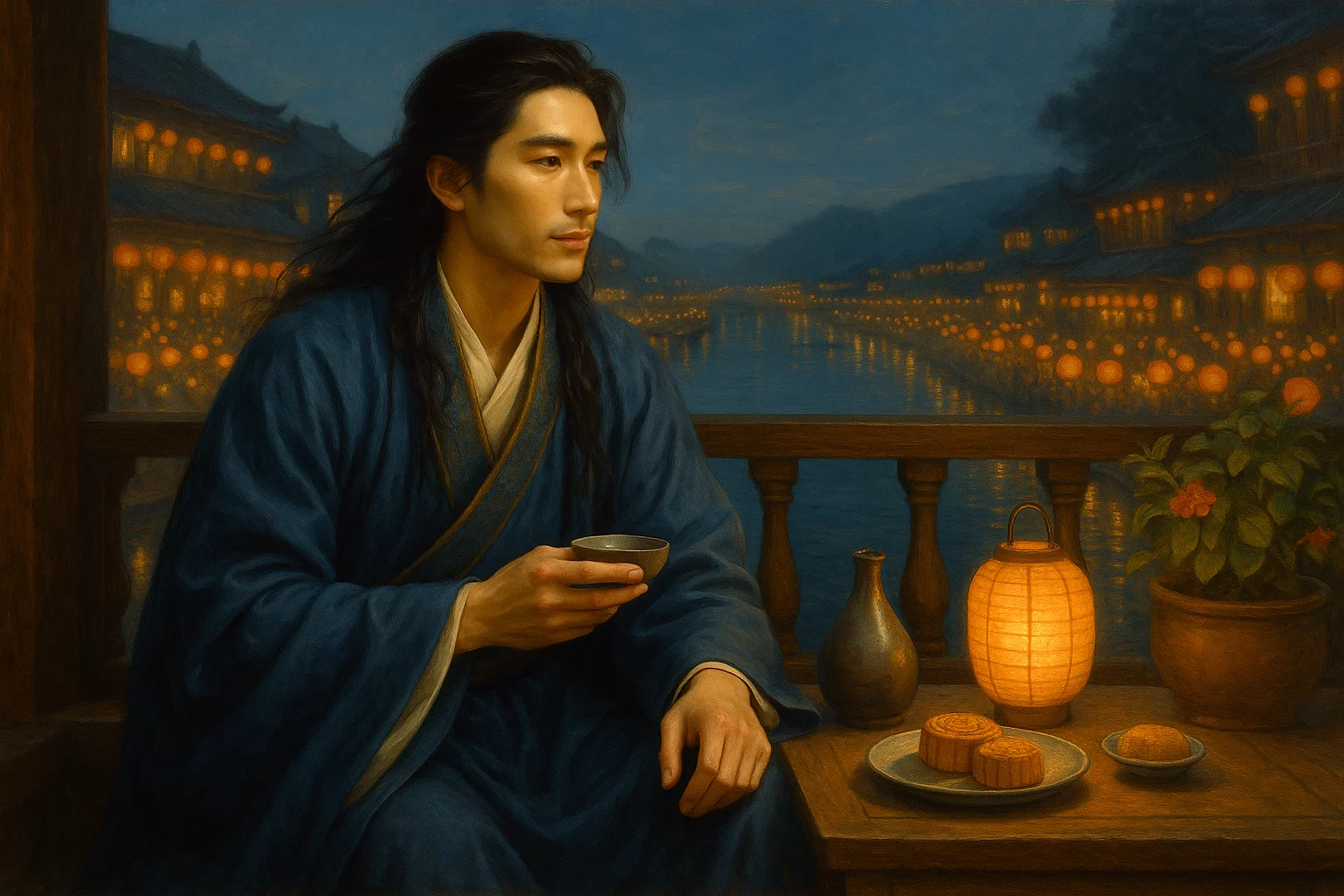
Zhou Bangyan (周邦彦 1056 - 1121), a native of Qiantang (modern Hangzhou, Zhejiang), was the culminating master of the wanyue (graceful and restrained) ci poetry of the Northern Song Dynasty. A virtuoso in musical temperament, his ci are renowned for their opulent refinement and technical perfection. He created dozens of new melodic patterns (cipai) and adhered to strict tonal rules, earning him the title "Crown of Ci Poets." His influence extended to Southern Song masters like Jiang Kui and Wu Wenying, establishing him as the founding patriarch of the Rhymed Ci School.






